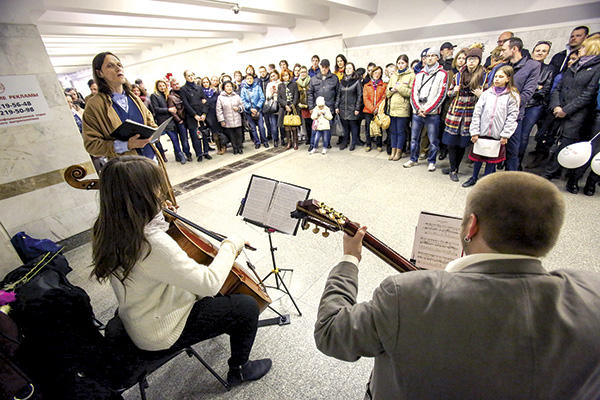Professional musicians change the stage for venues that attract crowds of fans
The subway is the most popular mode of transport on the planet — attracting many ordinary people. Elton John once pushed a grand piano on the London underground and also an old hippie with a guitar, Boris Grebenshchikov, sang soulful songs on the Moscow metro.

Music in Metro campaign at Pushkinskaya metro station in Minsk
Belarusian artists have gone further: last year, a large-scale musical event was organised by young composers in Minsk metro stations to celebrate Johann Sebastian Bach’s anniversary. This April was full of surprises. Bach was performed, naturally, while violinist Anastasia Popova and bass player Eric Orlov Shimkus entertained the public with brilliant music from the Baroque era in Uruchie station. The organiser of the Music in Metro campaign and young Belarusian composer, Vitaly Doroshuk, explains why the venue was chosen. “This was a symbolic place. The station name is Uruchie. In turn, Bach is translated as ‘spring’ from the German [‘ruchei’ in Russian]. It was fitting that his music was performed there,” he says.
This time the public could enjoy all sort of musical styles. These pieces are unlikely to be heard as part of serious concert programmes: the vocal ensemble of the Sonorus Capella performed Pérotin the Great’s music in Victory Square station. 12th-13th century spiritual chants sounded surprisingly organic under the stone arches of the modern underground. “Gregorian chants are not often heard but there’s no reason not to perform them,” said the Sonorus head conductor, Alexander Humala. “As you see by the circle of spectators, people stop to listen and take photos. The police patrol also stopped for a while to listen to our performance.”
In Pushkinskaya station, the Aquarelle Quartet performed works from the unique Belarusian-Polish movement of note: The Polotsk Notebook. Modern busy people might seem distant from 17th century music but crowds taking smartphone pictures of what was happening confirmed that our contemporaries are interested in everything, and ancient music can arouse the same interest as more fashionable melodies.

“To be honest, we were warmly welcomed! We did not expect such public support. We are thankful to our listeners. It was extremely pleasant to perform for them,” Yekaterina Pukst, Acquarelle soloist, admitted, after receiving great applause.
The wheeled lira was heard in Kamennaya Gorka station: this almost forgotten folk instrument was played by Belarusian State Philharmonic soloist — Sergey Dolgushev. This lira is only found on postage stamps in Belarus; apart from musicians, it’s probably only philatelists who know what it looks like.
This year, the schedule was more gentle for listeners: five stations were involved, each offering an hour-long programme. A gap of thirty minutes enabled people to enjoy several performances in a row. It was impossible to attend them all as the geography was wide, covering all corners of the city — so that no one area would be left out. The campaign ended in the Traktorny Zavod station, with a performance of Vivaldi.

Mr. Doroshuk described how the programme was planned during his metro travels, “I was travelling with headphones — listening to Pérotin and John Dowland. I thought their pieces would sound fabulous performed live. As I did last year, I offered the musicians I knew the opportunity to perform some pieces. I chose composers I liked. I’m glad that the organisation this year was a bit simpler. When we performed Bach in the metro for the first time, it was an experiment. We had no idea of how it would work out. Some people had doubts and argued that there’s no place for music in the underground. We already know however, that people welcome live performances extremely well. I have other ambitions too,” he explained. “I stand for the revival of the urban environment — for it to host something unusual from time to time. The city must live an interesting life.”
By Irina Ovsepyan











